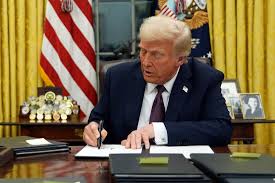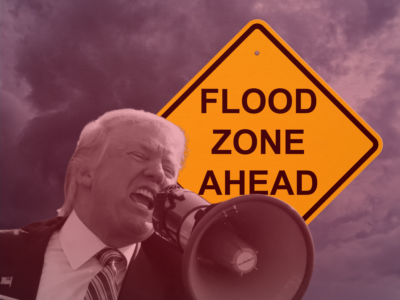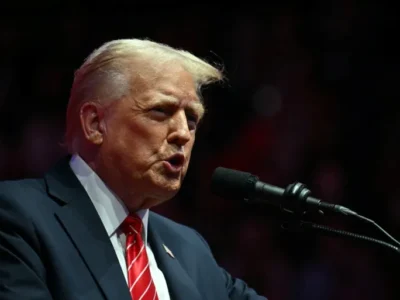Regulatory Policy
How to Lie with Percentages
It’s easy to make something seem big or small, depending on how you present the numbers.
We’re told that a given policy will only reduce U.S. emissions by something like 1%, which sounds trivial. But total U.S. carbon emissions are 4.8 billion tons. One percent of that is 48 million tons, which is a lot of carbon. At the current estimate of the social cost of carbon, reducing U.S. emissions by 1% would prevent $9 billion of harm.
CONTINUE READINGTracking the Trump Administration
Rollbacks of Climate, Energy, and Environmental Policies and Investments
The first month of the Trump Administration has resulted in a dizzying flurry of actions and reactions. Many of us are wondering how to track the status of these actions, including the legal challenges to these actions. Luckily, a number of institutions are keeping track of the range of policy and legal actions that are …
Continue reading “Tracking the Trump Administration”
CONTINUE READINGTrump Shoves Economic Analysis and Science to the Curb
The MAGA agenda takes precedence over data and analysis.
If you were looking for data-driven regulatory policy, you’re not going to find it in this Administration. On the contrary, Trump has marginalized economic analysis and wants to bulldoze environmental science. Thus, we are likely to get policies that are bad for the environment without being cost-justified, while ignoring policies who environmental benefits outweigh economic costs.
CONTINUE READINGTrump’s Seven Most Anti-Environmental Moves — and How to Push Back
There were dozens of actions, all harmful to the environment. These are the worst of the worst.
In the month since he reentered the White House, Trump has dedicated himself to knee-capping environmental protection through a series of executive orders. These orders aim to eliminate crucial environmental regulations, eviscerate key agencies like EPA, arbitrarily halt government funding, and eliminate environmental restraints on the private sector. But these are not done deals, and there are ways of pushing back.
CONTINUE READINGThe Trump Administration Is Trying an End Run Around Revoking California’s Car and Truck Rules
Zeldin’s actions face a major problem: the Congressional Review Act doesn’t apply to California waivers.
Last Friday, EPA’s Administrator Lee Zeldin announced a new and unprecedented way to try to prevent California from implementing its ambitious program to move toward 100 percent zero emission vehicles. This time around, the Trump Administration is trying a new tactic. Rather than revoking EPA’s decision (called a waiver) to allow California’s program to move …
CONTINUE READINGAll the President’s Men
The people occupying environment and energy positions will be anti-regulatory and pro-fossil fuel.
There will be a lot of dramatic fireworks on Day One of Trump’s second term, literally and figuratively. Yet his ability to achieve his agenda will depend on the people he’s chosen to run the government. His energy and environment picks will follow the party line of expanding fossil fuels. Yet they may not be as extremist as their predecessors in the first Trump Administration or as some of Trump’s advisors.
CONTINUE READINGWhat Happens If EPA Revokes the Endangerment Finding?
The action would mean full-blown warfare against all things climate.
We are likely to learn next week if the Trump Administration will eviscerate the most important climate regulations the Biden Administration issued over the last four years. Under Trump’s “Unleashing American Energy” Executive Order, EPA Administrator Lee Zeldin is supposed to recommend by February 19 whether to reverse the central basis for much of the …
Continue reading “What Happens If EPA Revokes the Endangerment Finding?”
CONTINUE READINGPresidential Blitzkrieg: Good Tactics, Questionable Strategy
Flooding the zone has short-term benefits but possible long-term costs.
Trump has issued a flood of executive orders. Many of those actions relate to energy and environment, with the general intent of handicapping clean energy and promoting fossil fuels. Flooding the zone has undoubtedly helped him dominate the news and may have stunned opponents. But shirt-ternm success doesn’t always translate into long-term gains.
CONTINUE READINGTrump Goes to War Against Environmental Justice
Apparently it’s “woke” to worry about excessive pollution in minority communities.
There is little or no basis for Trump’s claim that Clinton environmental justice order violated either civil rights laws or the Constitution. Trump’s embrace of this extremist view is an indication of just how much more radical his second term may be compared with his first. The law does not require the government to close its eyes to the harm its own policies may be causing to minority communities.
CONTINUE READINGTalking Climate Policy with an Energy Economist
An interview with leading energy expert Catherine Wolfram
Catherine Wolfram, a leading energy economist who has researched the impact of the Inflation Reduction Act, shares her views of the impact of the IRA, its likely fate, and the energy policies of the incoming Trump Administration. Wolfram served as the Deputy Assistant Secretary for Climate and Energy Economics at the US Treasury in 2021-2022
CONTINUE READING










